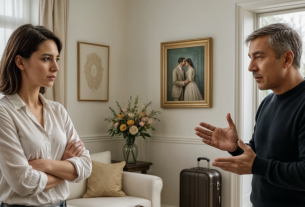In the atrium of the city’s mightiest corporate tower—the flagship lobby of one of the nation’s largest conglomerates—life moved with its usual ceremonial rush. Morning flipped an unseen switch: as the first sunlight slid through the wall-high panes of glass, a fresh tide of ambition, transactions, and ego spilled across the space. The marble didn’t just catch the light; it threw back faces—assured, severe, faintly superior. Staff in immaculate tailoring, tablets tucked like shields, earbuds in, swept toward the elevators as if the lifts were gates to destiny. Someone murmured into a phone about millions; someone else scrolled a calendar; another stared at a watch as if it kept the heartbeat of a career. Here, every step was measured, every word a tool, every look an appraisal.
It was a world where success was tallied not only in margins but in surfaces; where the scent of single-origin espresso mingled with the smell of power, and glass partitions drew a gleaming line between those “inside” and those forever “outside.” Being mattered less than seeming—seeming weighty, victorious, expensive. Into this carefully staged, almost theatrical order, she arrived—quietly, yet with a force that made everything stutter for a heartbeat.
Set against chrome trim and a mirror-bright floor, a young woman appeared, her silhouette at odds with the décor. A plain, slightly washed-out dress. Flats scuffed by miles of pavement. Hair scraped into a no-nonsense ponytail, untouched by any salon’s flourish. A timeworn leather bag that looked like it carried memories as much as belongings. In her hands—a paper envelope, clutched like a talisman. She paused beneath the high ceiling, feeling, perhaps for the first time, the pressure of the space settle on her shoulders. Her chest rose and fell—one deep breath, as though what filled her lungs wasn’t air but resolve. Then she moved.
“Good morning,” she said, soft yet distinct. “I have a ten o’clock with Mr. Tikhonov. I was asked to be here today.”
Behind the reception counter sat a young woman with flawless foundation, hair set to a glossy, unmoving wave, nails like tiny stilettos. She didn’t lift her gaze from the monitor.
“Are you here for a position?” she asked, cool as glass. “No one notified me.”
The newcomer held out the envelope. No extras. No tremor. Just proof.
Only then did the receptionist look up. Her gaze didn’t assess; it dissected. It slid over the scraped shoes, the unobtrusive dress, the old bag, the simple hair—lingering on each, as if hunting for reasons to dismiss.
“We’re not hiring cleaners,” she said, dry as dust. “Service entry’s around the back. And you can’t go near the elevators without a badge. Call your supervisor—Mr. Tikhonov.”
The girl hugged the envelope to her chest like a shield. She glanced around and caught the half-circle already forming—curious eyes, turned just enough to watch. A man in a Hugo Boss suit strode past, tossing a sideways smirk.
“So we’ve got a fresh import from the provinces?” he said, not bothering to lower his voice.
At his elbow, a woman in a designer sheath and needle-thin heels—straight out of a glossy spread—couldn’t resist:
“You might’ve dropped by H&M first. This isn’t a farmers’ market.”
Color rose in the girl’s cheeks, but her eyes—wide, dark, bright with something fierce—didn’t flinch. She offered neither apology nor explanation. She looked to the elevator, then back to the desk. She’d been told someone would meet her. That she was expected.
“This isn’t the post office,” the security guard cut in, stepping forward. “Nobody comes out for everyone. You can sit and wait. First, documents. Name?”
“My name is Anna Sergeeva,” she said. The slightest tremor brushed her voice, but there was steel beneath it. “And I’m not here by mistake.”
The guard shook his head, lifted his radio, and muttered into it. The circle tightened. Phones rose. Whispers sharpened. A caption was already being drafted somewhere.
“So, the countryside visits the capital?” another employee chimed in, nudging his designer frames into place. “You think they’ll let you through? People here know what money looks like. And you—like you rode in with a burlap sack of potatoes. What are you even doing here?”
Anna didn’t react. She straightened, and where fear had been, something like certainty began to heat her blood. Her stare stayed level—no blink, no smile, no plea. The quiet poise only needled those who preferred people like her to fold.
“Fine—stand there until you wilt,” the receptionist said, flicking the envelope aside as if it were litter.
And as if on a director’s cue, the elevator chimed. Doors parted. Out stepped a man in an immaculate suit, silver at his temples, a gaze trained by command. His eyes swept the lobby—then landed on Anna. His expression changed instantly. He came toward her at a clipped pace.
“Anna Sergeyevna! My apologies—I’m late,” he said, voice ringing. “I assumed they’d already taken you to your office.”
Silence. Heavy, absolute.
The receptionist blanched. Her fingers trembled. She looked from the man to Anna to the envelope on the counter, as if it had turned into a verdict.
“Do you understand who stands in front of you?” he asked, voice rising. “This is Anna Sergeyevna Sergeeva—our new CEO. Today is her first day. And you’ve just shown her your true face—without powder, without mask, without illusion.”
The lobby locked in place. The mockers dropped their eyes. The recorders fumbled to erase. One man edged back; another clutched his briefcase like a shield. Anna turned to the desk and, meeting the receptionist’s stare, said:
“I only wanted to see how you greet the unknown. Five minutes told me everything.”
She started toward the elevator. No smirks now. No lingering stares. The guard slipped aside. The receptionist lowered her head. The doors opened—almost deferentially. Anna stepped in, and the man—her escort—followed with the air of a chief of protocol. The doors closed. Sound returned to the lobby—no laughter, only thick whispering, the rustle of guilt, the bite of fear, and a dawning recognition: the ground had shifted.
The board convened in a hush. A room that usually crackled with swagger and crosstalk felt refrigerated. A long, dark-wood table. Glass walls from slab to ceiling. Screens asleep like sealed windows. Fifteen seats occupied—senior executives, deputies, division heads. Names that used to carry unchallenged heft now sat like students avoiding the teacher’s eye. One pinched a lapel to lay it flat; another rifled reports with restless fingers; a third stared so hard at the grain in the tabletop he seemed ready to vanish into it.
Then the doors opened.
She entered—the same woman who had been mocked like a nobody an hour and a half earlier. There was nothing timid left. She was command. A precisely cut navy suit that fit like intent. Hair twisted into a clean bun. Makeup pared back to emphasize not charm but authority. Every step had weight; every gesture, purpose. When she crossed the threshold, the room felt it: this was not merely a change of director. It was a change of weather.
“Good morning,” she said, even, unforced, final. “We’ll begin without preliminaries.”
She took the head seat. Opened a folder. Let a beat pass, meeting each pair of eyes. Her gaze didn’t just attend; it went through.
“Today I assume the duties of CEO,” she said. “Before we turn to business, I’m going to tell you who I am. Our work together starts not with charts, but with truth.”
No one rustled. The HVAC seemed to hold its breath.
“My name is Anna Sergeeva. I grew up in a village with two streets, one school, one library. My mother teaches. My father repairs engines. I learned the value of every ruble, every promise, every chance. I read by kerosene lamp when winter cut the power. But I read. I imagined a future. I did not quit.”
Her voice carried the weight of a confession with none of the self-pity. Only backbone.
“I came to the capital with a single backpack—no savings, no connections, one stubborn dream, and a head crowded with ideas. I graduated with honors. I interned in Europe and the U.S. I built three startups. One failed. One limped. The third was acquired by a global player. That’s when I understood: my work is not simply business. My work is people.”
She paused. Her eyes settled on the man in Hugo Boss—the one who had called her “the village.” He sat as if welded to his chair.
“This morning I expected a welcome. Instead, I received a lesson in culture. The receptionist wouldn’t glance at my letter. Security tried to escort me out. People laughed. Filmed. Passed judgment.”
Her gaze swept the table.
“That was the company’s face. Past tense.”
She tapped a button. The screens woke to a title slide: “Culture Reboot: Foundations of a New Leadership.”
“First: Respect. Not for titles, suits, or surnames—for human beings. Starting now, we launch an ethics program: training, mentorship, individual accountability. Complaints and reports—direct to me. No gatekeepers. No alibis.
“Second: Transparency. No back rooms. Personnel decisions—visible. Hiring—competitive and public. Your careers will hinge on outcomes, not on who shared a cocktail with you last night.
“Third: Mobility. We’re opening an internship track for students from the regions. Five new hires per quarter—no strings, no city snobbery. Memorize this: talent does not carry a postal code.”
One executive stood, trying to salvage dignity.
“Ms. Sergeeva, do you realize this could tear down the whole structure? It will injure people who spent years consolidating influence.”
“If the old structure takes the hit,” she replied, calm as a line drawn with a ruler, “then we have found the correct target.”
He sat. No words came.
“I didn’t come for vengeance,” she said, rising. The others rose as if pulled by a wire. “I came to work. But we will work differently. This morning some of you laughed. A year from now, you’ll be proud you stood at the start of this. Or you won’t stand here at all.”
She closed the folder. Walked to the door. Shut it—softly, with finality.
No one moved. Even the breathing thinned.
After a long minute, a voice at the far end of the table, hushed, astonished:
“Damn… She’s not a CEO by job title. She’s a CEO by nature.”
From that day, the axis shifted. Everyone who remembered the lobby that morning understood: behind the plain dress, the scuffed shoes, the quiet voice, there wasn’t merely a woman.
There was strength.
There was will.
There was the beginning of a new era.



